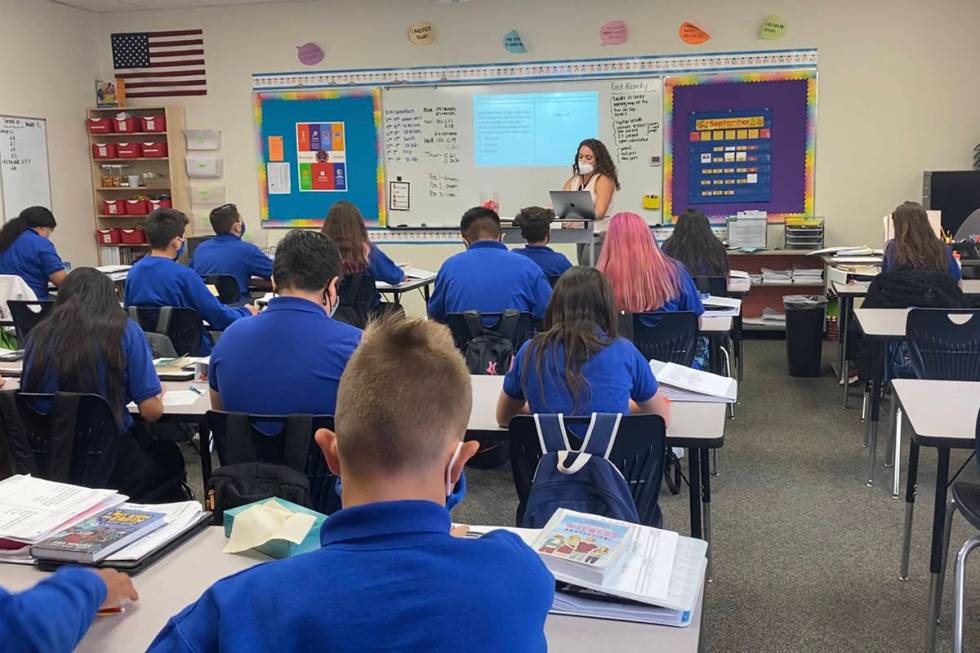EDITORIAL: New charters offer hope to Nevada’s students

In order to survive, charter schools must attract students who are unsatisfied with traditional public schools. Little wonder that so many charter entrepreneurs are interested in opening in Clark County.
As the Review-Journal’s Julie Wootton-Greener recently reported, this year, 44 groups have indicated they hope to open a charter school in Nevada. Last year, the State Public Charter School Authority received 27 letters of intent. Submitting a letter of intent is just the first step. Usually, only 20 to 30 percent of those groups subsequently follow through with an application. If that trend holds, there could be around 10 new charter schools opening for the 2022-23 school year.
Most of the interested parties seek to establish new campuses in the Las Vegas area. It’s another sign that the education provided by Clark County School District leaves much to be desired.
It’s also an indication of how prolonged pandemic school closures — often against the advice of public health experts and at the behest of teachers unions looking to squeeze more money out of elected officials — may lead to a realignment in public education. Both the Clark County and Washoe County school districts report less parental interest than anticipated in distance learning options for the fall.
“The pandemic has been a revelation for many Americans about union control of public schools that refuse to reopen,” The Wall Street Journal’s noted in March. “Nearly 50 school-choice bills have been introduced this year in 30 states. It’s a testament to how school shutdowns have made the advantage of education choice more evident, and its need more urgent.”
An American Federation for Children poll this year found that 71 percent of voters surveyed supported more educational options — an all-time high for the group’s national polling. An analysis by governing.com found, “The pandemic and all the frustrations it’s brought to parents have increased support for charter schools and vouchers. States that had resisted such ideas have ambitious new programs.”
The increasing interest charter operators are showing in Nevada and Las Vegas should be no surprise given the state’s dismal experience with remote learning during the pandemic. The number of alternative campuses has been growing for years — and appears poised to take off.
Nevada first authorized charter schools in 1997. Then-Gov. Brian Sandoval and the Legislature created the state charter board in 2011. In the 2011-12 school year, Nevada charters served around 13,000 students, according to a 2011 report from The Center for Education Reform. For the 2020-21 school year, charter schools authorized by the State Public Charter School Authority served more than 53,000 students.
That would make it the third-largest district in Nevada. At this rate of growth, Las Vegas charter enrollment will pass the Washoe shool district, which served 65,000 students, in the near future. The growth has likely contributed to an enrollment decline in the Clark County School District over the past few years.
In response, the education establishment keeps attacking charters. In 2019, the Legislature debated limiting new charter schools. The Nevada State Education Association argued charter schools are “largely unaccountable and not transparent as to their operations and performance.”
That’s hogwash. Charter schools are accountable for results. If a charter doesn’t do the job, parents can go somewhere else. The state board can also shut down low-performing charters.
On the other hand, traditional public schools are accountable for following procedures. For instance, their teachers must jump through certain hoops in order to receive a teaching license. But there’s little to no accountability for results. Just the opposite. They too often enjoy a captive audience, and education bureaucrats use failing students as proof that more funding is needed.
Education should be about helping children learn. Charter schools offer welcome alternatives. The pandemic only increased parental frustration with the status quo. It’s encouraging to see charter operators rising to meet demand. Families and students will be the ultimate winners.